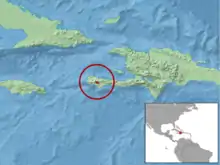| Eleutherodactylus thorectes | |
|---|---|
| Scientific classification | |
| Domain: | Eukaryota |
| Kingdom: | Animalia |
| Phylum: | Chordata |
| Class: | Amphibia |
| Order: | Anura |
| Family: | Eleutherodactylidae |
| Genus: | Eleutherodactylus |
| Species: | E. thorectes |
| Binomial name | |
| Eleutherodactylus thorectes Hedges, 1988 | |
 | |
Eleutherodactylus thorectes (common names: Morne Macay robber frog, Macaya breast-spot frog) is a species of frog in the family Eleutherodactylidae. It is endemic to Haiti and known from the Massif de la Hotte at high elevations.[2] Specifically, it is known from Pic Macaya and Pic Formon at elevations of 1,700–2,340 m (5,580–7,680 ft) asl. Its natural habitats are closed pine montane forest and cloud forest with shrubs, tree ferns, bromeliads, and climbing bamboo. With a snout-vent length of 12–15 mm, this slightly arboreal species is one of the smallest of the world's frogs.[3] It is threatened by habitat loss caused by charcoal logging and agriculture. It is known from the Pic Macaya National Park, but habitat degradation is occurring in the park too.[1]
References
- 1 2 Blair Hedges, Richard Thomas, Robert Powell (2010). "Eleutherodactylus thorectes". IUCN Red List of Threatened Species. 2010: e.T57004A11563733. doi:10.2305/IUCN.UK.2010-2.RLTS.T57004A11563733.en. Retrieved 16 November 2021.
{{cite journal}}: CS1 maint: multiple names: authors list (link) - ↑ Frost, Darrel R. (2015). "Eleutherodactylus thorectes Hedges, 1988". Amphibian Species of the World: an Online Reference. Version 6.0. American Museum of Natural History. Retrieved 4 July 2015.
- ↑ "Macaya Breast-spot Frog". Enzyclopedia of Life. Retrieved 17 July 2016.
